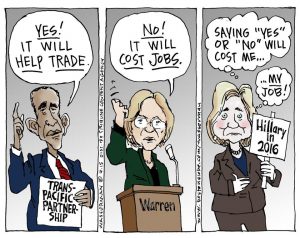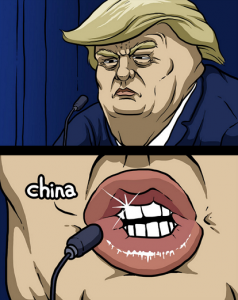“Never before have both main presidential candidates broken so completely with Washington orthodoxy on globalization, even as the White House refuses to give up. The problem, however, goes much deeper than trade deals.”
For the first time in 70 years, both of the 2016 Presidential candidates are rethinking free trade. With this digression from traditional American values and ideals, there is bound to be new rhetoric regarding trade, foreign policy, and China found between the two candidates. Clinton and Trump, both rooted in opposition against the preexisting situations with regarding foreign trade, are once again forced to be looked upon as ‘the lesser of two evils’ by us poor, confused, American voters.
The rhetoric that has been used thus far throughout the campaign has been focused on labeling China as a “currency manipulator that undervalues the renminbi to help its exporters win sales in overseas markets.”
More specifically, Trump is interested in getting ride of the Trans-Pacific-Partnership, a free-trade agreement between the US and a group of mostly Asian countries, while Clinton is saying that she opposes the agreement in its current form and would look to make strategic alterations.
An example of Trump’s harsh labeling and criminalization of China can be found in this quote from May, “We can’t continue to allow China to rape our country — and that’s what they’re doing — it’s the greatest theft in the history of the world.”
Through this, Trump is explicitly adhering to two criminal acts – rape and theft – and associating them with China, in order to raise feelings of concern and fear among his audience.
In contrast to Trump’s aggressive approach when discussing China, Clinton more subtly denounces her previous endorsement of TPP and focuses more on having a profitable relationship with foreign nations. “We have to trade with the rest of the world. We are 5 percent of the world’s population. We have to trade with the other 95 percent. And trade has to be reciprocal. That’s the way the global economy works. But we have failed to provide the basic safety net support that American workers need in order to be able to compete and win in the global economy.”
Though she acknowledges that change is necessary, it does not help her case that she is known to be a previously positive endorser for the TPP agreement, even referring to it as “the gold standard” in her book.
Overall, the rhetoric used by the two candidates regarding foreign trade and China reinforces the already existing rhetorical structure that each candidate has developed during the campaign. Though both are advocating for a change in policy, Hillary is framing hers in such a way that alienates her from Trump – ultimately hoping that Trump’s harsh appeals will appear more unstable, allowing her to assume a more worldly, experienced, and presidential role.


